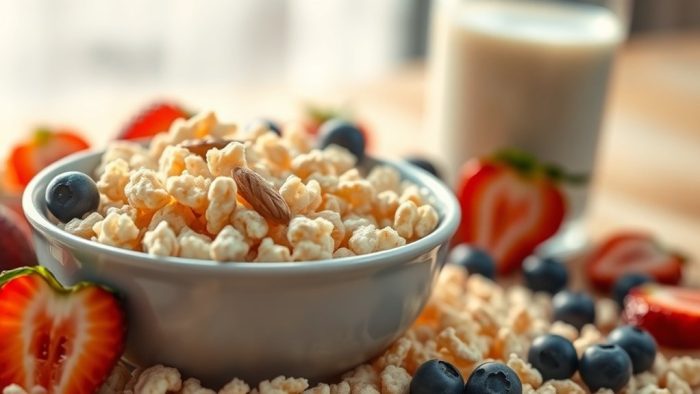Is Cocoa Vegan

Yes, pure cocoa powder is vegan since it’s made solely from ground cocoa beans without any animal products. You’ll find both natural and Dutch-processed varieties are plant-based in their pure forms. However, you should always check labels on commercial cocoa products, as some contain added milk powder or dairy derivatives. Cross-contamination during processing can also be a concern. For the most nutritional benefits and ethical sourcing practices, look for certified organic and fair-trade options that align with your vegan values.
What Is Cocoa and How Is It Made?
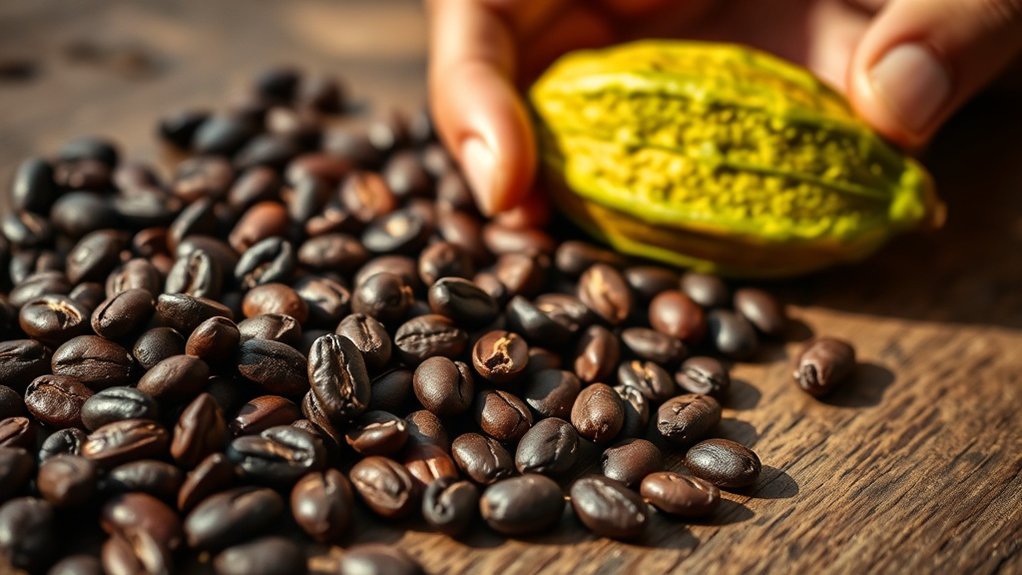
Cocoa begins its journey in tropical regions where farmers harvest large, football-shaped pods from Theobroma cacao trees.
You’ll find that these pods contain beans that undergo fermentation for several days, followed by sun-drying and roasting. The roasted beans are cracked open, revealing cocoa nibs inside.
These nibs are ground into cocoa liquor, which can be pressed to separate cocoa butter from cocoa solids. The remaining solids become cocoa powder, containing 8-26% fat depending on processing methods.
Some manufacturers use Dutch processing, treating cocoa with alkalizing agents to neutralize acidity and create smoother flavors.
When you’re wondering “is cocoa powder vegan” or “is chocolate powder vegan,” understanding this production process helps clarify that pure cocoa powder itself doesn’t inherently contain animal products.
Understanding the Difference Between Cocoa Powder and Chocolate
While many people use the terms interchangeably, cocoa powder and chocolate are fundamentally different products with distinct compositions and nutritional profiles.
Cocoa powder is the solid residue remaining after cocoa butter extraction from cocoa beans—it’s pure, unsweetened, and typically vegan. In contrast, chocolate contains cocoa liquor, sugar, and cocoa butter, often with added milk or dairy ingredients that compromise its vegan status.
You’ll find various processing methods create different cocoa powder types, including Dutch-process (alkali-treated) and raw cacao powder (nutrient-dense). This distinction matters for your dietary choices.
Don’t confuse pure cocoa powder with chocolate drink mixes, which frequently contain added sugars and dairy products. Understanding these differences helps you identify truly vegan products and make informed nutritional decisions.
Types of Cocoa Powder: Natural Vs Dutch-Processed
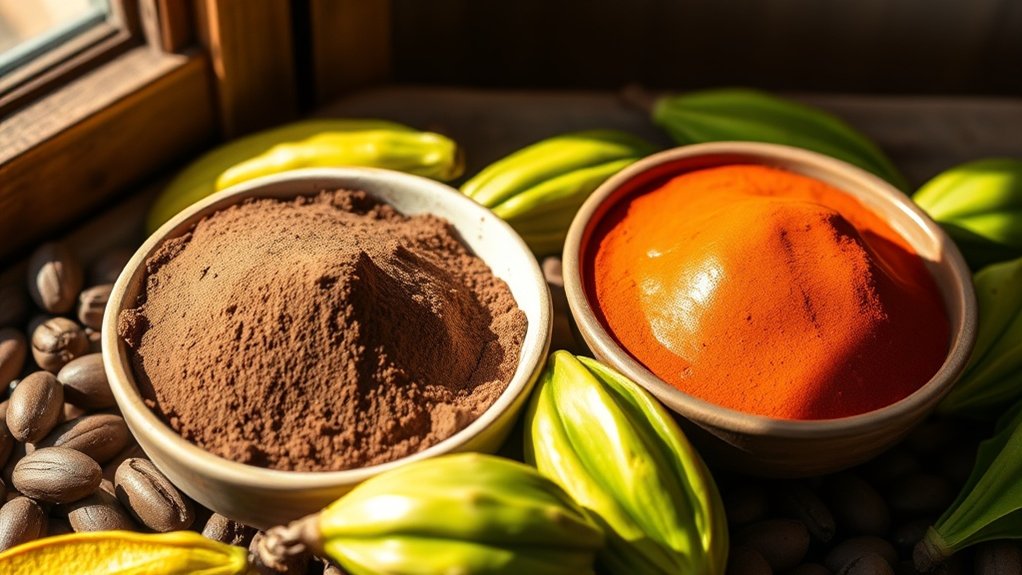
When selecting cocoa powder for your recipes, you’ll encounter two primary processing methods that greatly impact flavor, color, and chemical properties.
Natural cocoa powder undergoes fermentation and roasting before grinding, preserving its acidic pH and bitter, intense chocolate flavor. Dutch-processed cocoa powder receives alkalizing treatment, neutralizing its acidity to create a milder taste and darker appearance.
This pH difference affects baking chemistry—natural cocoa’s acidity activates baking soda, while Dutch-processed varieties require baking powder. You can’t freely interchange these types in recipes without adjusting leavening agents.
Both remain vegan in their pure forms, though you should verify labels for non-vegan additives. Fat content varies between 8-26% across both types, with pure versions meeting vegan dietary standards.
Why Pure Cocoa Powder Is Always Vegan
By examining the production process of cocoa powder, you’ll understand why it’s inherently vegan. Pure cocoa powder comes from ground cocoa beans with cocoa butter removed—a mechanical process involving zero animal products. The resulting powder contains 8-26% fat, all plant-derived from the original bean.
Both natural and Dutch-process cocoa powder remain vegan, as alkalization simply adjusts pH without introducing animal ingredients. Unsweetened cocoa powder contains only one ingredient: cocoa solids from the Theobroma cacao plant.
However, you’ll need to verify labels on commercial chocolate products and hot cocoa mixes, which often add dairy powder, whey, or casein. These additives compromise the vegan status, though the cocoa powder base itself stays plant-based.
When purchasing, choose products listing only “cocoa powder” as the ingredient.
When Cocoa Products Become Non-Vegan
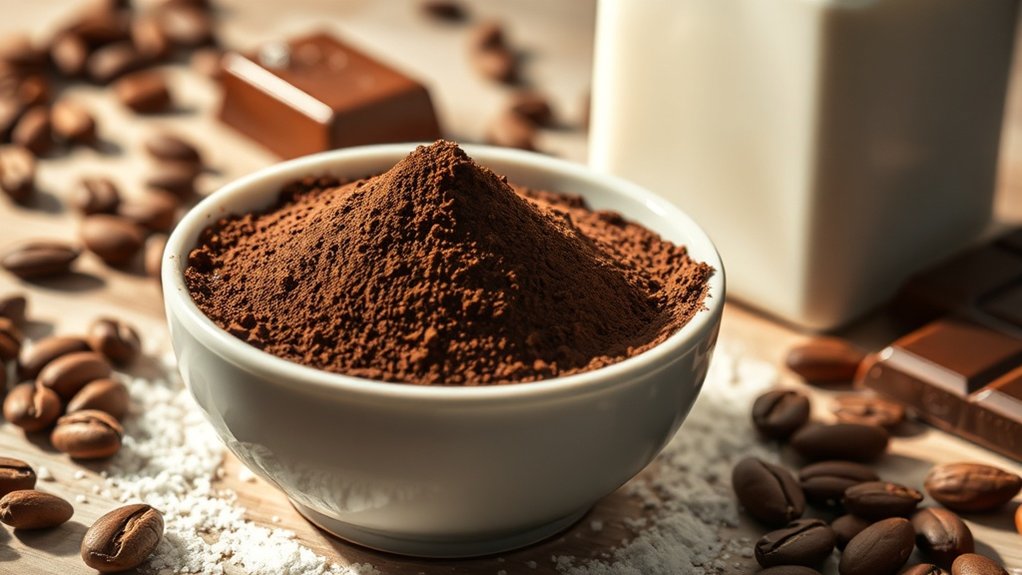
You’ll find that pure cocoa transforms into a non-vegan product when manufacturers add dairy ingredients like milk powder, whey, or casein—common additions in hot chocolate mixes, milk chocolate bars, and many processed cocoa products.
Cross-contamination poses another concern, as some cocoa powders are processed in facilities that handle dairy, potentially exposing the product to milk proteins that can trigger allergic reactions and compromise vegan status.
Reading ingredient labels carefully remains essential since these dairy derivatives often hide under technical names that aren’t immediately recognizable.
Added Dairy Ingredients
While pure cocoa powder remains entirely plant-based, manufacturers frequently transform this vegan ingredient into non-vegan products by adding dairy components.
You’ll find these additions particularly common in hot chocolate mixes and chocolate bars, where they improve creaminess and flavor but compromise vegan status.
Common dairy ingredients that make cocoa products non-vegan include:
- Milk powder and condensed milk – added for texture and sweetness
- Whey and casein – milk proteins used as binders and flavor boosters
- Cream and butterfat – incorporated for richness in premium products
- Dairy-derived flavorings – including lactose and milk solids
You must scrutinize ingredient labels carefully, as these dairy additions aren’t always obvious.
Even products marketed as “dark” chocolate can contain milk fillers, making thorough label reading essential for maintaining a vegan diet.
Cross-Contamination During Processing
Even when you select products with purely plant-based ingredient lists, cross-contamination during manufacturing can introduce animal-derived substances into your cocoa.
Facilities processing cocoa alongside dairy products present significant risks, particularly when equipment isn’t thoroughly cleaned between production runs. This trace contact can compromise products that are otherwise vegan.
You’ll notice many cocoa powders lack explicit cross-contamination warnings, making brand research essential.
Hot chocolate mixes carry particularly high risks since they’re frequently manufactured in shared facilities with dairy products. Manufacturers aren’t always transparent about their processing methods, so you should contact companies directly if you maintain strict vegan standards.
Understanding these processing realities helps you make informed decisions that align with your dietary principles while acknowledging the practical challenges of complete contamination avoidance.
Ethical Sourcing and Fair Trade Considerations
Beyond the plant-based nature of cocoa itself, the vegan community increasingly prioritizes ethical sourcing practices that align with core animal rights values—namely, preventing exploitation and suffering.
When evaluating cocoa’s ethical credentials, you’ll want to take into account:
- Child labor prevalence: Nearly 2 million children work on cocoa farms in Ghana and Ivory Coast, raising serious human rights concerns.
- Fair wage standards: Fairtrade certification guarantees farmers receive living incomes and work under safe conditions.
- Company transparency: Major producers like Hershey’s, Mars, and Nestlé have faced scrutiny for their sourcing practices.
- Certification verification: Look for Fairtrade, UTZ, or Rainforest Alliance labels indicating sustainable and ethical production.
Research brands directly and communicate with companies to verify their sourcing practices, making sure your chocolate choices reflect your values.
Nutritional Benefits of Cocoa Powder
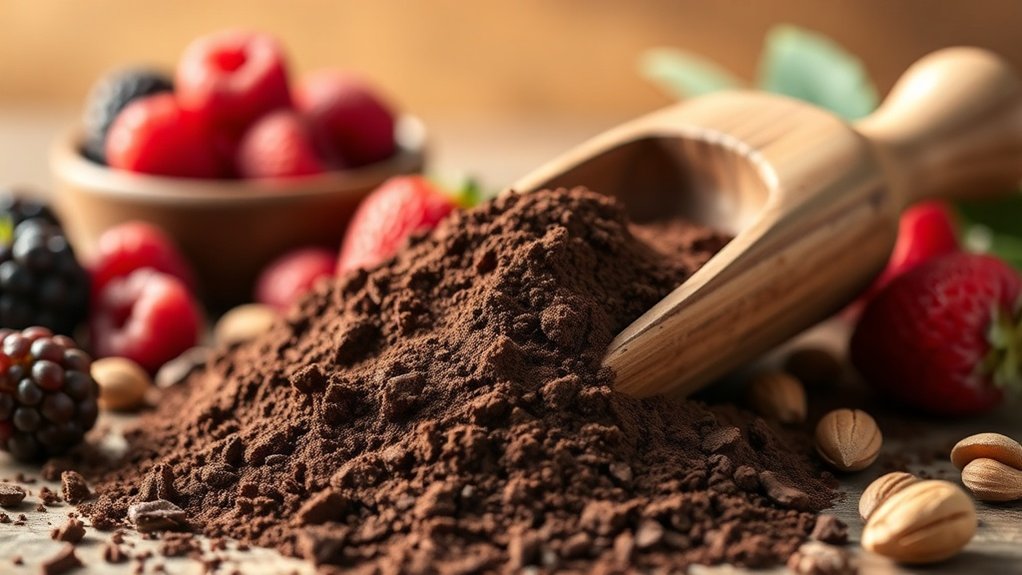
When you incorporate cocoa powder into your vegan diet, you’re adding a nutritionally dense ingredient that provides significant amounts of magnesium, iron, and zinc—minerals that support bone health, oxygen transport, and immune function.
The flavonoid antioxidants in cocoa powder work to reduce inflammation and improve cardiovascular health by lowering blood pressure and improving blood vessel function.
These nutritional benefits make cocoa powder particularly valuable for plant-based diets, where strategic food choices help guarantee adequate micronutrient intake.
Essential Minerals and Antioxidants
Cocoa powder delivers an impressive concentration of essential minerals that your body needs for peak function.
You’ll find significant amounts of magnesium, iron, and zinc—each playing vital roles in immune support and energy metabolism. The antioxidant profile is similarly remarkable, with flavonoids standing out as powerful compounds that combat inflammation and reduce your risk of developing chronic diseases.
These key benefits make cocoa powder nutritionally valuable:
- Magnesium, iron, and zinc support immune function and cellular energy production
- Flavonoid antioxidants neutralize free radicals and decrease inflammatory responses
- Dietary fiber improves digestive health and promotes beneficial gut bacteria
- Theobromine acts as a natural stimulant, improving mood and cognitive performance
Research confirms that regular cocoa consumption can improve cardiovascular health by optimizing blood flow and helping manage blood pressure levels.
Health Benefits for Vegans
For vegans who face unique nutritional challenges, cocoa powder offers targeted health advantages that address common dietary gaps.
You’ll benefit from its rich mineral profile, including magnesium for muscle function, iron for oxygen transport, and potassium for cellular energy production.
The exceptional flavonoid content, particularly epicatechin, improves cardiovascular health by boosting blood flow and reducing blood pressure.
Cocoa’s potent antioxidants combat oxidative stress and inflammation, supporting your body’s defense systems.
You’ll also experience cognitive benefits, as cocoa increases serotonin levels, improving mood and mental function.
Research indicates that regular cocoa consumption may boost insulin sensitivity, potentially lowering your type 2 diabetes risk.
These evidence-based benefits make cocoa powder a valuable addition to your plant-based nutrition strategy.
Common Misconceptions About Cocoa and Veganism
Why do so many consumers assume chocolate automatically fits into a vegan diet? This misconception stems from cocoa’s plant-based origins, yet processing and added ingredients often compromise vegan status.
Key misconceptions you should understand:
- All dark chocolate is vegan – Many brands add dairy fillers or milk-derived compounds, requiring thorough label examination.
- Cocoa and cacao are identical – While both originate from plants, cocoa undergoes more processing that may involve animal-derived filtering agents.
- Pure cocoa powder equals all cocoa products – Hot chocolate mixes and blends frequently contain milk powder, whey, or casein.
- Plant-based means ethically sound – Cocoa production involves child labor and exploitation concerns, prompting some vegans to boycott products despite technical vegan compliance.
You’ll need ingredient verification rather than assumptions when selecting vegan cocoa products.




